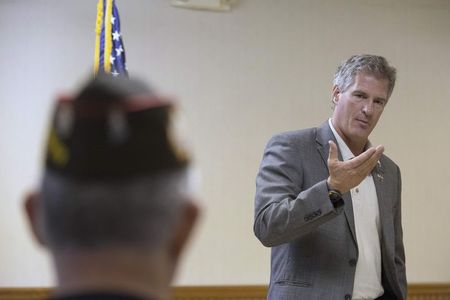By Ted Siefer
MANCHESTER N.H. (Reuters) - Former Massachusetts U.S. Senator Scott Brown aims to complete his rebranding as a native son of New Hampshire on Tuesday by winning the Republican nomination to run against incumbent U.S. Senator Jeanne Shaheen in November.
Brown faces a three-way primary with former state Senator Jim Rubens, whose campaign has won the backing of a new super-PAC aimed at reducing the role of money in U.S. politics, and former U.S. Senator Bob Smith.
Prominent U.S. Republicans, including Arizona Senator John McCain, former Massachusetts Governor and failed 2012 presidential candidate Mitt Romney and former Florida Governor Jeb Bush have all thrown their weight beyond Brown, seeing his candidacy as a chance for their party to retake a majority in the Senate, which Democrats currently control by a 53-45 margin.
Brown stunned Massachusetts Democrats in 2010 when he won the seat held by Edward M. Kennedy for a half-century. He lost to Elizabeth Warren in his first re-election bid, in 2012, and did a stint as a Fox News commentator before moving to New Hampshire, where he was raised, late last year with an eye on another run for office.
On the campaign trail, he has presented himself as a voice for compromise in Washington and generally struck more moderate policy positions than Rubens and Smith.
But some voters said they were still holding Brown's years in Massachusetts, where also worked as a lawyer, against him.
"New Hampshire is getting to be too much like Massachusetts," said Robert Leith, shortly after casting his ballot for Rubens in Nashua, which borders Massachusetts.
Rubens' campaign has also won national backing, from a recently formed Super PAC with the improbable mission of reducing the role of money in politics.
The Mayday PAC, dreamed up by Harvard Law School professor Lawrence Lessig and funded in part by Silicon Valley moguls, last month began running ads in support of Rubens, who backs the group's idea of replacing the current campaign finance system with a taxpayer-funded model that Lessig says would ultimately reduce the influence of wealthy special interest groups.

The vote comes on the last day of primary voting in the United States. Voters in Massachusetts, Rhode Island, New York and Delaware are also heading to polls.
(Writing by Scott Malone; Editing by Cynthia Osterman and Dan Grebler)
